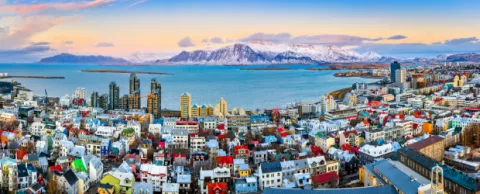
While Iceland falls into the top 50 percent of countries by geographical size, most of its population of 329,000 is centred in and around the capital, Reykjavik. Iceland is proving, however, that having a small population can be used to a country’s advantage, pulling together and becoming more resourceful when it comes to utilizing the latest technology. The result: Iceland is now the most sustainable country on earth, with 100 percent renewable hydro and geothermal power sources. Below, let’s take a look at how one city, in particular, Reykjavik, is helping Iceland boost its global reputation as a leader in terms of energy sustainability and smart solutions with three key factors that are really making a difference.
Connected homes: At the moment, Reykjavik Fibre Network, one of the world’s most advanced and True Open Access Fibre Networks, is offering 100 percent Fibre to the Home (FTTH) connectivity in the city and plans to connect neighbouring towns this year. The average Internet speed around the world is 3.5 megabits per second, with more developed countries reaching up to 10 megabits per second. With this type of network, speeds in Reykjavik can reach up to 500 megabits per second and can be used by multiple services and providers at the same time, such as different voice and television providers.
Efficient transportation: Straetó is one example of a useful transportation app that has been downloaded 85,000 times, quite a large amount for a city of just over 330,000. Not only has the app enticed more citizens to use local buses, it’s also helped visitors navigate public transport by mapping the best bus route to take from their current location. In addition to increasing city bus usage, Reykjavik has debuted a car-sharing service in partnership with Zipcar and ON Power, Reykjavik’s energy company that harnesses geothermal energy for over half of the country’s population. The first access points have been installed at Reykjavik University and The National University Hospital of Iceland, with a fleet that includes electric vehicles like Nissan’s Leaf EV. A similar smart island initiative worked on Menorca, as the island looked to renewable energy strategies by teaming up with Nissan to launch projects revolving around 100-percent electric mobility and energy management.
Government interaction: With the Better Reykjavik website, citizens can submit ideas concerning anything from school opening times to new playgrounds. Then, the city council debates the most popular ideas to see which ones are worth implementing. Since debuting a decade ago, 60 percent of citizens have used the forum and the city has spent €1.9 million on the development of more than 200 projects based on citizens’ ideas. With this free open source platform, citizens are given a voice to make real change in the city, with other countries like Estonia following suit.
By looking at key areas that affect citizens, from improving transportation to making residents (and their homes) more connected, Reykjavik is leading the pack in Iceland making the country more efficient and one of the top in terms of energy sustainability on the globe.



